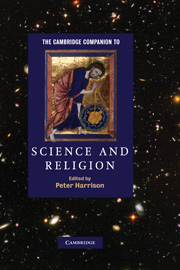Book contents
- Frontmatter
- Introduction
- Part I Historical interactions
- Part II Religion and contemporary science
- Part III Philosophical perspectives
- 11 Atheism, naturalism and science: three in one?
- 12 Divine action, emergence and scientific explanation
- 13 Science, God and cosmic purpose
- 14 Ways of relating science and religion
- A guide to further reading
- Index
14 - Ways of relating science and religion
from Part III - Philosophical perspectives
Published online by Cambridge University Press: 28 July 2010
- Frontmatter
- Introduction
- Part I Historical interactions
- Part II Religion and contemporary science
- Part III Philosophical perspectives
- 11 Atheism, naturalism and science: three in one?
- 12 Divine action, emergence and scientific explanation
- 13 Science, God and cosmic purpose
- 14 Ways of relating science and religion
- A guide to further reading
- Index
Summary
The number of books and articles written during the past twenty years on the relationship between science and religion is truly amazing, and new ones are coming out almost every day. The ideas propounded vary widely and the question arises of whether it is possible to classify these differing viewpoints in any meaningful way. An important challenge in the science-religion discussion is therefore to categorize the main ways of relating science and religion. How might this be done in an illuminating and unbiased way that is neither too simplistic nor too complex? The best-known attempt to offer such an account is Ian Barbour's four-fold typology: the conflict view, the integration view, the dialogue view and the independence view. Others scholars such as Willem B. Drees, John Haught, Ted Peters and myself have responded to Barbour's work and suggested modifications or alternative typologies. In this chapter I shall try to take these discussions a step further.
- Type
- Chapter
- Information
- The Cambridge Companion to Science and Religion , pp. 278 - 295Publisher: Cambridge University PressPrint publication year: 2010
- 16
- Cited by



